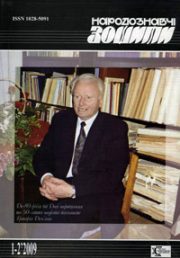The Ethnology Notebooks. 2021. № 4 (160), 840—848
UDK[398.2:355.4(470+571:477):303.6-057.36]: 930.2″191/201″
DOI https://doi.org/10.15407/nz2021.04.840
KILAR Anastasia
- ORCID ID: https://orcid.org/0000-0003-3360-513X
- Postgraduate student of the Department
- of historical ethnology,
- Ethnology Institute оf the National
- Academy of Sciences of Ukraine,
- 15 Svobody ave., Lviv, Ukraine, 79000,
- Contacts: e-mail: anastasiakilar@gmail.com
Abstract. Respondents’ stories about the Russian-Ukrainian war are rich in a large number of stories, images, new military folklore, and traditions. A large number of plots are considered: the soldiers’ ideas about death, fear, brotherhood. These ideas distinguish a person from others. The topic of the article is relevant given that the recording of interviews is on the «hot trail», because the war is still going on. These memories provide a unique opportunity to highlight topics that are not written about in textbooks and academic literature. The proposed topic is poorly researched, its disclosure will be the basis for the study of many scientists. The aim of the article is to analyze the uniqueness of modern evidence of the war, to compare with previous periods from 1914. The object of the study is the memories of eyewitnesses of the Russian-Ukrainian war. To analyze this issue, we used the source base, which is based on interviews with eyewitnesses of the Russian-Ukrainian war, literature on the First and Second World Wars. Oral history methods were used to write the work, which helps to reproduce information about the war first hand, as well as a comparative-historical method. It is extremely important for us, as historians, to have time to record the experience of fighters, because while the memories are fresh, the respondent has some thoughts, experiences, emotions, over time and attitude to events changes, calmer begin to respond to certain things, and the memories themselves can forget, especially about critical, painful moments at the front (and this is a perfectly normal reaction of the human body to the experience).
Keywords: Russian-Ukrainian war, combat brotherhood, first battle, Armed Forces of Ukraine, apotropaics.
Received 30.07.2021
REFERENCES
- Archive of the Institute of Ethnology оf the National Academy of Sciences of Ukraine (hereinafter: Archive of IE NASU). F. 1. Op. 2. Act. 830: Field ethnographic materials on the topic «Warrior in the ethnocultural tradition of Ukrainians: social status and stereotypes of perception» recorded by Kilar Anastasia, Pikulytska Khrystyna, Bulka Svitlana in February 2017 — June 2019 in Lviv and Odessa [in Ukrainian].
- Roche, А. (2018). The First Sex. Change and Crisis of Male Identity. Kyiv [in Ukrainian].
- Kuzmenko, O. (2018). Dramatic Human Existence in Ukrainian Folklore: Conceptual Forms of Expression (the period of WWI and WWII). Lviv [in Ukrainian].
- Lysyak, O. (Ed.) (2003). Brody. Collection of articles and essays. Drohobych [in Ukrainian].
- Sharyi, I. (2008). Sichovyky near Kruty. Kruty: A collection of memory of Kruty’s heroes (Pp. 85—90). Kyiv [in Ukrainian].
- Archive of IE NASU. F. 1. Op. 2. Act. 829: Field ethnographic materials on the topic «Warrior in the ethnocultural tradition of Ukrainians: social status and stereotypes of perception» recorded by Kilar Anastasia in January 24—27, 2016 in Chernomorsk, Odessa region [in Ukrainian].
- Grechylo, A. (2015). World War I and Ukrainian national symbols. Ukraine: cultural heritage, national consciousness, statehood (Issue 26, pp. 99—106). Lviv [in Ukrainian].
- Kuzmenko, O. (2015). On folklore concept of prayer in people’s oral creations as for the great war: Ukrainian experience. The Ethnology Notebooks, 2, 283—289 [in Ukrainian].
- Kobylyansky, V. (2013). Music in the life of Ukrainian insurgents in the Carpathians (second half of the 1940s — early 1950s). Galicia (Vol. 24, pp. 331—343). Ivano-Frankivsk [in Ukrainian].





